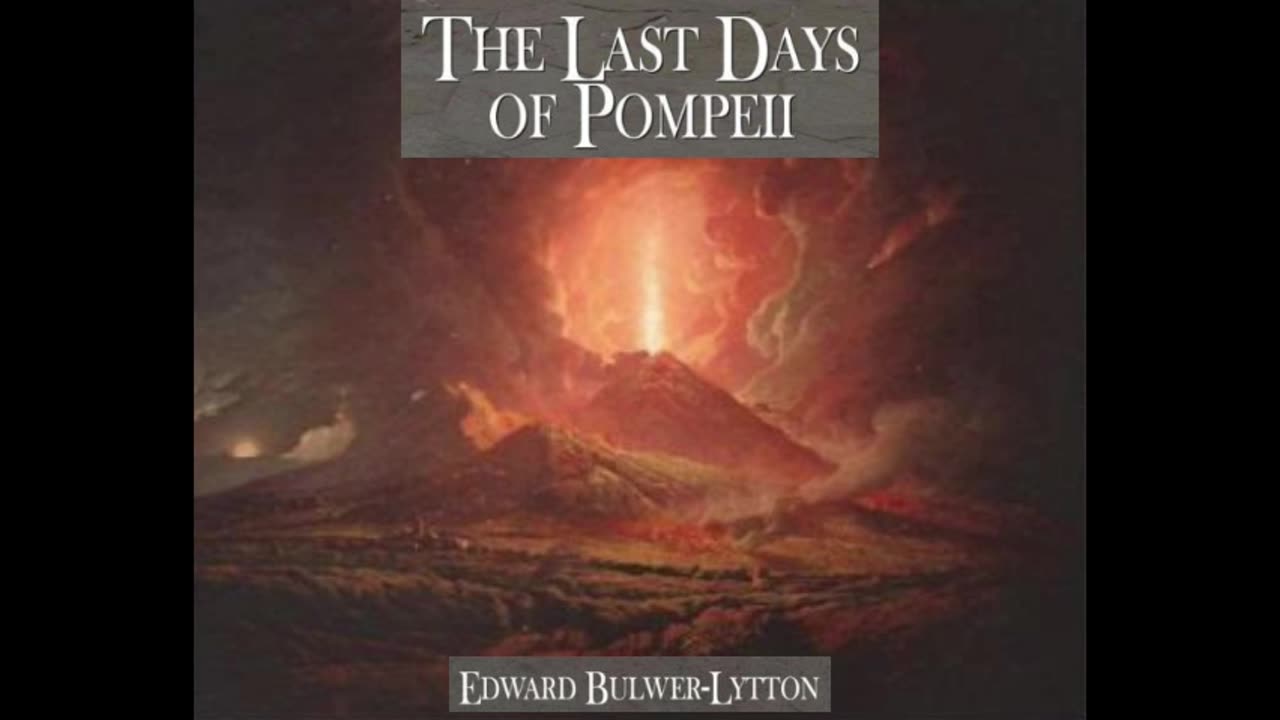Premium Only Content

Last Days of Pompeii by Edward Bulwer-Lytton (1834)
The Last Days of Pompeii is a historical novel by Edward Bulwer-Lytton, set in ancient Pompeii during the final days before the catastrophic eruption of Mount Vesuvius in 79 AD. Published in 1834, the novel weaves together romance, adventure, and moral themes, all set against the backdrop of the impending disaster that would engulf the ancient Roman city. Bulwer-Lytton was inspired to write this work after visiting the ruins of Pompeii, which had been rediscovered in the 18th century and were still being excavated during his time.
The novel follows several key characters as they navigate the complexities of Roman society. These include:
Glaucus: A noble Greek living in Pompeii who represents honor and virtue.
Ione: A beautiful and innocent woman who becomes Glaucus' love interest.
Arbaces: The Egyptian priest, a central antagonist, known for his manipulative and sinister nature, representing dark mysticism and corruption.
Nydia: A blind slave girl in love with Glaucus, whose unrequited love is a poignant subplot in the novel.
The story explores themes of love, betrayal, loyalty, and moral decay, while also providing detailed depictions of Roman culture, religion, and daily life in Pompeii. The novel culminates in the dramatic and vivid portrayal of the eruption of Vesuvius, which obliterates the city and serves as a divine retribution for the moral decline that Bulwer-Lytton believed was evident in the lives of the characters.
Themes:
Bulwer-Lytton contrasts the debauchery and corruption of some characters, such as Arbaces, with the noble virtues of characters like Glaucus. The eruption of Vesuvius is symbolically depicted as the judgment of the gods on the immoral practices of Pompeii’s citizens.
The inevitability of the volcanic eruption lends the novel a sense of impending doom, as readers know the characters' fates are sealed from the start. This creates tension and drama throughout the novel.
The novel delves into the religious and mystical beliefs of the time, particularly through the character of Arbaces, who practices Egyptian magic and manipulates others through fear and superstition.
Bulwer-Lytton’s prose in The Last Days of Pompeii is characterized by its grand, elaborate style, typical of Victorian-era literature. He uses rich descriptions to bring the ancient city to life, painting detailed pictures of the Roman villas, public forums, and daily life in Pompeii. His focus on classical virtues and his fascination with ancient cultures shine through in his detailed historical descriptions, making the novel an immersive experience for readers interested in the classical world.
Upon its release, The Last Days of Pompeii became a popular and influential novel, praised for its vivid portrayal of ancient Roman life and its engaging blend of romance and historical drama. It appealed to Victorian readers' fascination with antiquity and moral tales. The novel has been adapted into numerous plays, films, and television productions, cementing its status as a significant work of historical fiction.
About the Author:
Edward Bulwer-Lytton (1803-1873) was a notable English novelist, playwright, and politician, renowned for his extensive literary contributions as well as his involvement in various intellectual and esoteric circles. He was born into an aristocratic family and became one of the most popular writers of his time, with works spanning multiple genres, including historical fiction, romance, the supernatural, and early science fiction.
Masonic and Esoteric Affiliations:
Freemasonry:
Edward Bulwer-Lytton was initiated into Freemasonry, becoming an active member of the craft. While specific details about the degrees he achieved or the exact lodges he was associated with are not widely documented, it is known that Freemasonry's symbolic and philosophical teachings had a significant influence on his writing. His novels, such as Zanoni and The Coming Race, reflect themes common in Masonic philosophy, such as the pursuit of hidden knowledge and the moral implications of power.
Rosicrucianism:
Bulwer-Lytton was closely connected to the Rosicrucian movement, an esoteric order that focuses on spiritual enlightenment and the pursuit of mystical knowledge. His novel Zanoni is often cited as a Rosicrucian allegory, exploring the journey of an initiate through trials and transformations leading to higher consciousness and immortality. The philosophical and mystical ideas presented in his works align closely with the Rosicrucian worldview.
Occult Interests:
Bulwer-Lytton had a deep interest in the occult, including mesmerism (a precursor to hypnotism), spiritualism, and other mystical practices that were popular during the Victorian era. His exploration of these subjects is evident in his literature, where he often depicted the supernatural and the unseen forces that influence human life.
Influence on Later Esoteric Movements:
Although Bulwer-Lytton was not directly affiliated with later organizations such as the Hermetic Order of the Golden Dawn, his work had a considerable impact on the members of this and other esoteric societies. His portrayal of secret knowledge and advanced spiritual practices in his novels provided inspiration for many occultists in the late 19th and early 20th centuries.
Edward Bulwer-Lytton’s literary and esoteric legacy is significant, with his novels continuing to be studied for their symbolic content and insights into the mystical philosophies that captivated him. His influence extends beyond literature into the realms of occultism and mysticism, where his exploration of hidden knowledge and spiritual power remains of enduring interest.
-
 47:13
47:13
Deus Meum Que Jus
23 days agoWilliam Cooper - Michael Schiffman, World Parliament of Religion - 9.8.93
465 -
 DVR
DVR
Josh Pate's College Football Show
6 hours ago $0.77 earnedCFP Reaction Special | Early Quarterfinal Thoughts | Transfer Portal Intel | Fixing The Playoff
4.54K -
 23:55
23:55
CartierFamily
3 days agoElon & Vivek TRIGGER Congress as DOGE SHUTS DOWN Government
54.7K74 -
 5:43:44
5:43:44
Scammer Payback
2 days agoCalling Scammers Live
141K21 -
 18:38
18:38
VSiNLive
2 days agoProfessional Gambler Steve Fezzik LOVES this UNDERVALUED Point Spread!
104K17 -
 LIVE
LIVE
Right Side Broadcasting Network
10 days agoLIVE REPLAY: President Donald J. Trump Keynotes TPUSA’s AmFest 2024 Conference - 12/22/24
5,072 watching -
 4:31
4:31
CoachTY
1 day ago $27.59 earnedCOINBASE AND DESCI !!!!
147K11 -
 10:02
10:02
MichaelBisping
23 hours agoBISPING: "Was FURY ROBBED?!" | Oleksandr Usyk vs Tyson Fury 2 INSTANT REACTION
76.8K13 -
 8:08
8:08
Guns & Gadgets 2nd Amendment News
2 days ago16 States Join Forces To Sue Firearm Manufacturers Out of Business - 1st Target = GLOCK
104K87 -
 10:17
10:17
Dermatologist Dr. Dustin Portela
2 days ago $18.00 earnedOlay Cleansing Melts: Dermatologist's Honest Review
143K14